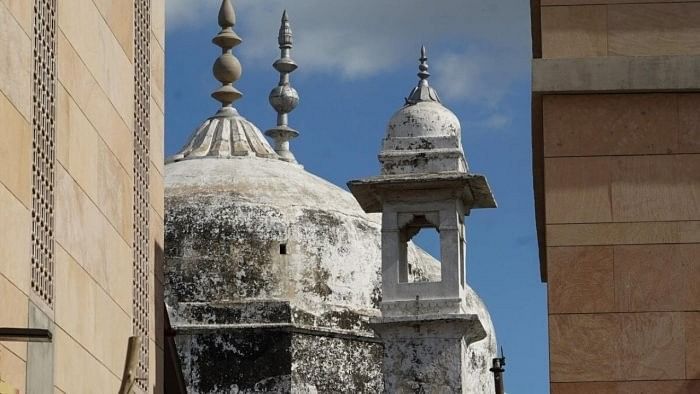
A view of the Gyanvapi mosque.
Credit: PTI File Photo
The Archaeological Survey of India (ASI), which conducted a scientific survey of the contentious Gyanvapi Mosque premises in Varanasi, submitted the survey report in a Varanasi district court on Monday.
According to the lawyers of the litigants, the ASI has submitted the report in a sealed cover. The court has fixed December 21 for further hearing of the matter.
Hours before the submission of the report, the Muslim litigants filed an application in the court seeking the court's directive that the report be submitted in a sealed cover and that no part of the report be made public.
The lawyers said that the court might open the report on December 21 when the matter came up for further hearing and hand over its copies to them.
The court had initially directed the ASI to submit the report in September but the latter sought extensions stating that the work was not complete. The court had finally directed the ASI to submit the report by December 18.
The ASI, during the scientific survey, which had started on August 4, used ground penetrating radar and other scientific instruments to ascertain what lay beneath the surface of the Gyanvapi Mosque premises. The ASI team also surveyed the inner and outer walls, the cellar and other parts of the premises barring the 'wuzukhana' (the place where the Muslims wash themselves before proceeding to offer prayers).
The survey of the Gyanvapi Mosque premises began after the Allahabad High Court rejected the petition filed by the Muslim litigants seeking a stay on the Varanasi court's order for a scientific survey by the ASI.
The premises had been a bone of contention between the two communities for the past several decades but there was renewed clamor to ''take back'' the Kashi Vishwanath Temple premises by the saffron outfits after the favourable decision of the apex court in the Ram Temple case.
The Hindu petitioners contended that a part of the temple had been demolished by the Mughal emperor Aurangzeb in the 17th century. The Muslim side contended that the Mosque existed before the reign of Aurangzeb and also claimed that the same had also been mentioned in the land records.